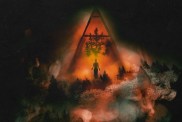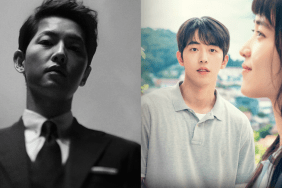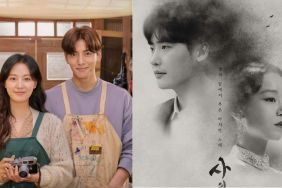On influences, music, keeping it low budget and real

Newcomer Bryan Bertino understands that if you want to strike an unnerving chord with your audience, you have to hit ’em where they live. A drive-by cinematic assault not with an M-16, but a goddamn rocket launcher. And that’s why, for his feature debut, Bertino eschewed a showy, FX-heavy horrifying spectacle of a narrative for a more deliberate, contained affair entitled The Strangers which examines – sans any CSI-esque procedural trappings – one couple’s late-night encounter at 1801 Clark Road with three masked loonies.
In the last year, Rogue Pictures’ delay of The Strangers – starring Liv Tyler and Scott Speedman as Kristen and James, respectively – has perhaps incited more curiosity in the film than any detraction. Message board users and bloggers tapping into the film’s marketing campaign which touts it is “based on true events.” But what macabre case did Bertino lift from? In our second interview with the writer-director, some truths are revealed as we catch Bertino on the phone two weeks out from his film’s summer debut.
You can find our initial chat with him in our piece entitled Never Talk to Strangers.
ShockTillYouDrop.com: The last time we spoke, you voiced a rabid affinity for Tobe Hooper’s Texas Chainsaw Massacre – I’d love to hear more on why you connect with that film so much…
Bryan Bertino: I’m from Texas, for one, and when it starts out and they’re driving in that van and everyone’s sweaty, I remember being a kid driving around Texas in a van with no air conditioning. Off the top, I remember being drawn into that film, but as I got older, I’ve watched it several times and I think what inspires me now about that movie is the use of sound, the use of really stark images. Stark music. The way that so little is used to manipulate. It so overpowers me. As a horror director, the scene I reference is when they’re walking up to the house and that generator is introduced and we’re not listening to any horror film score that tells us, Oh no, this is the house we should be frightened of and something bad is going to happen. It’s just that generator rumbling. You go into the house and everything is so still and then bam, Leatherface appears. That sums up everything that I feel is great in horror. It’s a low budget movie but I think horror sometimes belongs in the low budget. The movie just inspired me that way.

Shock: What struck me about your film is not just the score by Tomandandy but some of the country pieces, too. Can you talk about what went into the selection?
Bertino: I knew early on when I made my pitch to direct the film…I brought in my computer and laid out ten or twelve songs that were just playing in the background. I was inspired by country music and folk music and, to me, I wanted to do a film that had those elements in it. When I wrote the script, I was thinking about it not having a score at all. I loved the idea of a record player playing this music that every time James and Kristin hear it, at times, we hear that. When Mama Tribe is blasting in the house, it’s like I wanted it to feel that way for everybody. I definitely tried to work with the budget that we had – as far as post-production budget – to say, I want to put these songs in it. The people that inspired me are Gillian Welch, Merle Haggard – these are people that, when I was writing the script, I was listening to, so I felt like it grounded it for me.
Shock: What’s spinning in your iPod now?
Bertino: Strangely enough, not country music. I keep going back to Radiohead because I’m really into the new album. On HDNet I saw a live performance and their entire album reminded me of how much I really love that band. So, I listen to them, but a lot of Gillian Welch. She’s probably one of my favorites. Bob Dylan is one I go back to. I’ve been listening to a lot of Desire these days.
Shock: What prompted your decision to get into filmmaking?
Bertino: I studied cinematography in college. At the University of Texas you’re limited and only the people with money can direct, you have to pay for the film. Back in college I never got the chance to “learn” to direct because I didn’t have the money. Being a cinematographer taught me how to tell stories visually and when I moved out here I started writing because I wasn’t being given a chance to tell stories anymore. I wasn’t one of those kids who was making movies on super-8mm, but I knew that I always loved movies more than anybody else I was hanging out with in Texas. I reacted very strongly to what films can do, but my influences…I think John Cassavetes and Terrence Malick have more to do with what has inspired me over the last couple of years. Raymond Carver, his short stories paint more pictures in my head than say any one horror film to direct or anyone associated with that. As I’ve gotten older, my tastes expanded. I’ve always been interested in ’70s genre, because it’s a great opportunity to see real character development in high concept stories.
Shock: All of that comes across in The Strangers, very much so in the pacing.
Bertino: When I started cutting the film, we said to my editor Kevin Greutert – who has done all of the Saw films – ‘Look, man, I don’t want to do a lot of quick cuts and I don’t want to do a lot of flashy stuff.’ I didn’t want it to be overtly ’70s, but I wanted it to feel like it could’ve been made in 1976.

Shock: In a situation like what James and Kristen face, what would you do?
Bertino: [laughs] It’s funny, I hear a lot of strangers stories now. But, what’s weird is I’m the guy that leaves the lights on to go to bed because I think I spend so much time thinking about the darkness of man that I don’t trust anyone anymore, let’s just say that. I leave the lights on everywhere. When you turn the lights off, that’s when the killer outside says, ‘Okay, it’s time to go to work.’ So, you’ve got to leave those lights on.
Shock: This film is being heavily sold as being “Based on a True Story” and many of Shock’s readers have been hypothesizing which case you’re taking your inspiration from. Have you been following this and, if so, what’s the wildest theory you’ve read?
Bertino: The one that blows me away, is that someone has created a link that’s like a Google map of every single 1801 Clark Road in the United States with a description of why that could be or couldn’t be the place it happened. The amount of work…I was impressed with. To lay it all out there. I don’t think the [webmaster] ever presented which one he thought it was, but he was building an argument that I was very impressed with.
Shock: And what ultimately is this based on? I recall you saying at one time that you cobbled together various events, right?
Bertino: Yeah, that’s the thing. To me, what it ended up being is that I wanted to tell the story of the victims. When I was a kid, I read Helter Skelter. I went off to this small town to stay with my grandmother and my dad – I have no idea why – said, ‘Hey, do you want to read a book while you’re gone?’ And he gives me Helter Skelter which is definitely big boy reading. Even now, what grabs me, even now, is that it’s not the section about who Charles Manson or what was going on with the family. I was thinking about the Tate murders and realizing that these detailed descriptions had painted a story of what it was like in the house with the victims. But none of the victims knew about the Manson family or why it was happening to them. So, I got really fascinated with telling the victims’ tale. And not filling it in with an FBI profile and not filling it in with finding out that somebody’s grandmother beat them and now they want to kill everybody. You read obituaries every day where someone is killed for a random reason. Yes, we may eventually find out why, but sometimes they don’t. With 1801 Clark Road, people can look at that and say, ‘Where is that address?’ But the reality of it is, that’s the address I grew up in. I just picked that address because I wanted to ground the film in as much reality as possible. As a writer, there wasn’t anything I wanted James to do that I felt that I could do. There was no amount of bravery. I tried to do a gut check. When we made the movie, Scott tried to do a gut check. Just how brave would I be? I didn’t want this movie to be about what would you wish you would do as much as what would you do?

Shock: Where do you stand on the horror genre in the last fifteen years?
Bertino: I think this is an exciting time. Horror moves in waves but I think there are great waves where new things come around and art is able to grab us and bring us back to that primal fear we all have. I think horror is about to find its new wave. Yes, I think people get tired of the stuff out there, but the thing I love about horror is that everybody wants to get scared. For me, the stories I tell are very much basic characters, characters and drama that people can relate to. I would love nothing more than to have drama horror be the new wave. I will say, as far as films in the last fifteen years that I like. I’m one of the people who loved The Blair Witch Project. I don’t care that the camera is shaky and Heather says f**k a lot. I felt like I was totally brought in that world. I really liked The Descent, I thought Neil Marshall did a great job. I jumped during that movie and I don’t jump all of the time.
Shock: A fanboy question for you…which “Stranger” is your favorite out of the three?
Bertino: Man, let me think… I like the man in the mask because I always loved the simplicity of it. I think my favorite is Pin-Up Girl, there’s something just creepy about when the shadows hit those eyes and the circles around them are completely black.
The Strangers opens in theaters on May 30th. For Bertino’s thoughts a possible sequel, check out this news item.






Source: Ryan Rotten









